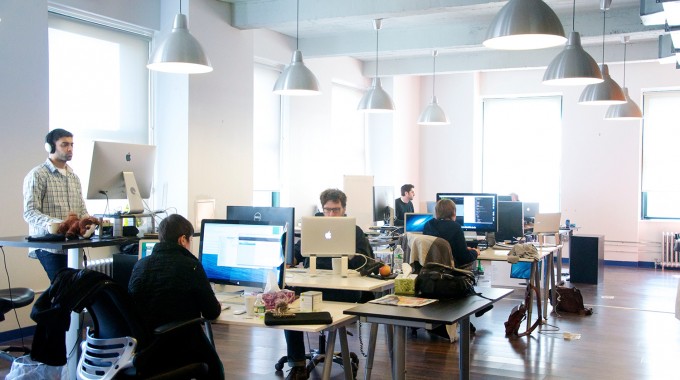If you know of a Columbia College student, faculty member, alumnus/alumna or program we should spotlight, or if you would like to submit a story, please contact:
Columbia College
Office of Communications
cc-comms@columbia.edu

“Startups will go where the talent is… so the more that we as an institution can do to connect students with those opportunities, the better the startup community as a whole will be and certainly the better our students will be.” —Patrick Smith, senior associate director of employer outreach, CCE
In the summer of 2013, the Columbia Organization of Rising Entrepreneurs (CORE)’s student leadership approached the Center for Career Education (CCE) with an innovative idea: an internship program that would pair Columbia students with high-potential startup companies, while providing the structure and support of a traditional University-sponsored internship program.
“A lot of people don’t know the startup environment. They don’t know that startups are a huge opportunity,” said Miranda Li CC’17, a member of CORE. “One of CORE’s missions is to promote entrepreneurship at Columbia, and a great way to do that has been to encourage students to intern at startups, get to know the environment and see what’s possible.”
The result of the CCE/CORE collaboration was the creation of the Startup Internship Program (SIP), CCE’s latest addition to its diverse roster of spring internship programs. The program, which was launched in 2014, connects students with some of the highest-potential startups in New York City, helping them sharpen their skills, providing them with professional career development and teaching them about the challenges and triumphs of growing a business in the marketplace.
"Fundamentally, I think Columbia students are here because they want a challenge that helps them grow faster," said Kevin Zhang CC’14, a former CORE president and co-founder of SIP who has since hired two interns for Fundera, his current employer, through the program. "They want an inordinate amount of responsibility. They want an organization where they're making a significant impact, both on the company and on society. It's easy to go from these basic premises to the realization that a startup environment is the best way to go."
“The startup industry in New York City is growing,” says Patrick Smith, senior associate director of employer outreach for CCE and a member of the CCE team who worked with CORE to create SIP. “Startups will go where the talent is… so the more that we as an institution can do to connect students with those opportunities, the better the startup community as a whole will be and certainly the better our students will be.”
SIP draws upon the industry knowledge, resources and experience of CCE, as well as the student input of CORE members. Responding to student needs, the SIP internships include non-technical as well as technical roles in the startup field, everything from marketing and communications to human resources and software development. Eleven students participated in the program’s inaugural run, at companies in fields ranging from finance and healthcare, to marketing, consumer goods, public policy, fashion and more.
“[SIP] has been a really great way to promote entrepreneurship on campus, to give people the chance to intern at a startup and see what the environment is like,” says Li, who was one of the first students to participate in the new internship program.
SIP marks the first collaboration between a student organization and CCE on an internship program. In addition to pre-vetting participating startups to ensure high-quality internships, CCE also offered student participants pre-program training, a mid-semester dinner with other SIP interns, one-on-one career counseling appointments throughout the semester and an end-of-program reflection session. “We wanted to create a community experience for our students to support them throughout the semester,” says Heather Perceval, associate dean of CCE. “Like our other spring semester internship programs, participants are doing these internships on top of everything else they have to do, and that support is really important.”
“What’s great about this partnership,” Perceval added, “is that CORE is so in tune with what students want and need… [while] CCE, in addition to providing institutional resources, is able to maintain the stability of the program from year to year, helping students to grow the program continuously.”
Smith says SIP helps students build connections with one another, along with potential employers – networking that is essential in the startup world. Student participants agreed.
Unlike internships at large, established companies, “interning at a startup means working closer to people who are higher in the company, and feels less like being one piece in a machine. You get more responsibility and know exactly how you're contributing to the company,” says Nikhil Krishnan CC’14, who interned at UBER through SIP during the spring of 2014.
The networking that startup companies can provide is one of several benefits that set them apart from larger, more traditional internship programs. “By working at a startup, especially one like Uber that everyone knows, people know that I can work in small teams and get things done quickly,” says Krishnan. “I got my current job largely because I proved that I already had experience and knowledge of the tech and startup scene by being involved in another startup.”
Click here to learn more about the Startup Internship Program.
Chloé Durkin CC ’15 is a senior English major in Columbia College and a student web editor for the Columbia College website. She is the president of Latenite Theatre and choreographer of the 121st Annual Varsity Show. This story appeared in the 2013–2014 Columbia College Annual Report.